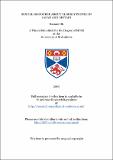Files in this item
Sexual discourse about elderly people in Japan and Britain
Item metadata
| dc.contributor.advisor | Riches, David | |
| dc.contributor.advisor | Overing, Joanna | |
| dc.contributor.author | Oh, Kazumi | |
| dc.coverage.spatial | vi, 152 p. | en_US |
| dc.date.accessioned | 2018-06-19T13:05:56Z | |
| dc.date.available | 2018-06-19T13:05:56Z | |
| dc.date.issued | 2005 | |
| dc.identifier.uri | https://hdl.handle.net/10023/14256 | |
| dc.description.abstract | This thesis attempts to pursue and envisage the concrete pathway relating elderly people's sexuality at a discourse level in a broader socio-political context in Japan and Britain as modernised industrial societies. Three key facets may greatly enrich not only academic discourse on elderly people's sexuality but the various meanings regarding being old in modernised industrial societies. (1) Change in sexual discourse about elderly people demonstrates human sexuality and so allows us to forge ties with scientific data, medicine and sexology. (2) At the same time, we can appreciate that at a superficial level, changes in discourse refer to most basic heterosexual, married and age-stratified gendered relationships. (3) Notwithstanding such change in discourse, involving the move from asexuality to sexuality, one particular discursive idea, namely the 'critical view' of elderly people's sexuality, has always existed as a background notion. We address the first and second points from the social constructionist view. On the first point, the elderly population are capable of initiating themselves the fresh thinking that reflects changes in discourses, with the soon-to-be-old middle aged as catalysts. However, with regard to the third point, considerations of the incomplete nature of the change in discourses are closely related to the question of the elderly's own unique biological position. Elderly people's own unique biological position is beyond social constructionists' reach. A look beyond the positions of biological essentialism and social constructionism may provide us with the opportunity to view elderly people's sexual and sensual fulfilment from a perspective that would otherwise be impossible. Such analyses are important in listening to noises of elderly people's sexuality within "an ensemble of" highly modernised and industrialised societies. We may dare to refer to these noises as the freedom of being marginal. | en_US |
| dc.language.iso | en | en_US |
| dc.publisher | University of St Andrews | |
| dc.subject.lcc | HQ30.O5 | |
| dc.subject.lcsh | Older people--Sexual behavior--Japan | en |
| dc.subject.lcsh | Older people--Sexual behavior--Great Britain | en |
| dc.subject.lcsh | Older people--Japan--Public opinion | en |
| dc.subject.lcsh | Older people--Great Britain--Public opinion | en |
| dc.title | Sexual discourse about elderly people in Japan and Britain | en_US |
| dc.type | Thesis | en_US |
| dc.contributor.sponsor | Rotary Club (Osaka, Japan) | en_US |
| dc.type.qualificationlevel | Doctoral | en_US |
| dc.type.qualificationname | MPhil Master of Philosophy | en_US |
| dc.publisher.institution | The University of St Andrews | en_US |
This item appears in the following Collection(s)
Items in the St Andrews Research Repository are protected by copyright, with all rights reserved, unless otherwise indicated.

